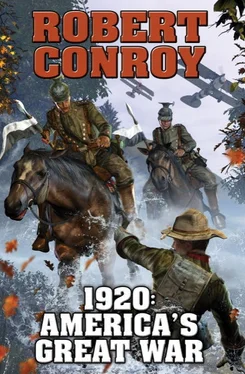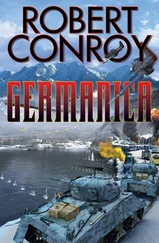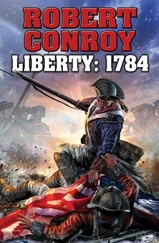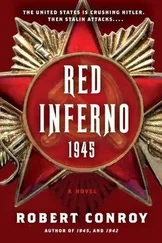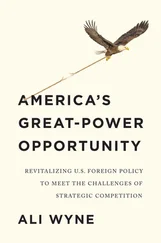The young captain who commanded the troops in the bunker sat beside Luke on the wooden bench. His name was Ward and he was a friendly sort, even though he was harsh when it came to dealing with subordinates. He was trying to convince them that he knew what he was doing and wasn’t afraid of the Germans.
The shelling had been going on for hours. It was beyond Luke’s comprehension and belief. There was nothing in his experience to even remotely compare with what was going on above him. And it was all prelude, the real battle had yet to commence.
It had also been a most unpleasant surprise. Luke’s intentions had been to visit the front, observe, take some notes, and leave, but the sudden and unexpected shelling had trapped him. Now he wondered if his coming to the front was going to be a tragic mistake.
Ward laughed hesitantly. “At least the bombardment keeps the Krauts away, sir. When it stops, it will mean that their damned infantry will be well on their way to our trenches. While they’re trying to keep us pinned down, they’ll attempt a barrage in front of their advancing troops.”
At which point, the Americans would pour out of the bunker and into their own trenches, and rain small-arms fire on the attackers. Luke knew all this, but understood that Ward felt a need to talk, to prove that he knew what was happening and that neither he nor his men should be fearful.
A crack appeared in the roof of the bunker and dirt poured onto the floor. For a moment they all thought it was going to collapse, but it didn’t and they began to breathe again. “It’s like an earthquake,” Luke said.
Ward nodded. “The ground, the solidest earth, seems to be turned into mud by the shelling. It has no substance. It must be what an earthquake is like.”
“Wouldn’t know,” Luke said. “And I’d prefer to keep it that way.” Ward laughed and a couple of soldiers within hearing distance nodded appreciatively.
Martel turned and looked at the infantrymen stare at him and Ward. They were the poor bloody bastards who were going to try and stop the Germans who would soon be assaulting from their positions.
If the bunker in which he cowered was any indication, the German artillery had been ineffective. There had been numerous direct hits on the roof of the bunker, but it had withstood them all. Even the new crack above them seemed stable. They understood that German infantry doctrine would have the cannon fire stop well before the actual assault to prevent hitting their own troops. It was a prudent measure, but the brief warning caused by the halt would enable the Americans to take their positions and begin killing Germans.
Luke tried to act relaxed. “Captain Ward, has anyone considered what might happen if a shell blocks our exit?”
“That, sir, is why we have built several exits. If all else fails, I have thirty men who will dig like fools to get ourselves out before we suffocate.”
The firing seemed to diminish. Ward barked an order and two men went to the tunnel that led up to the trench. They opened the door and one of them gingerly went out and up the stairway. The second followed behind him.
Martel heard the crack of an explosion and the last soldier was thrown back into the bunker, engulfed in a cloud of smoke. A long metal splinter from a shell had been driven into his chest. He screamed once and fell silent as blood poured from the wound. Incredibly, the first soldier returned unhurt as the shelling picked up again.
“Not clear yet, sir,” the soldier reported quickly and unnecessarily.
The shelling intensified and reached a new crescendo. “This is the end of it,” Ward said. Luke agreed. It was like a Fourth of July fireworks display with everything fired as the climax and finale.
There was a sudden and ominous silence. Ward took a deep breath and looked at his frightened troops. He was as scared as they, but he would never let them know it. Suddenly, Luke wanted to stay in the bunker for the rest of his life.
Incongruously, the phone rang. The buried phone lines hadn’t been severed by the bombardment. Ward answered it and listened for a second before hanging up.
“Come on,” he said with a calmness that impressed Luke, “let’s kill some Germans.”
Luke waited until the last soldier had left the bunker. They had positions to go to; he did not. As he emerged into the smoke-filled daylight, he choked, then blinked to regain his vision. Automatically, his mind began to assess the damage done by the German artillery. It was surprisingly little.
In some places, a trench had been hit and the walls collapsed, but these were infrequent. Shell craters pocked the land in front of and behind the trenches, but the trench lines themselves were basically intact. So too were the thickets of barbed wire. Some had been tossed about and rearranged, but, like the trenches, they were fundamentally undamaged. Luke made another mental note.
He took a deep breath. In place of the clammy air of the bunker was the scent of cordite and the sickly-sweet stench of burning flesh. It told Martel that the dug-in American Army had not escaped entirely unscathed, although common sense told him that much of the burning flesh was more likely horse than human.
The infantrymen had taken their places on their firing stations and were aiming their rifles down the slight slope. The Americans had one real advantage; they held the high ground. The hill wasn’t much, but it enabled them to look across the valley and down to the German lines. It also meant that their trenches were fairly dry, and not filled with mud and muck.
“Krauts!” Ward hollered.
Martel squinted into the distance. The smoke caused a whitish haze, but he saw wavy rows of dots in the tall, thick grass. He looked through his binoculars and the dots became men trudging towards him. Their rifles were at the ready and they were burdened with packs. They seemed to move slowly, agonizingly slowly, even though he knew they were trotting.
As before, American artillery opened up and shells hit in and above the advancing ranks. Men dropped or were hurled aside like toys, while other shells ripped flesh to pieces. Martel felt ill at the killing. This was not fighting. It was murder on an assembly-line basis, warfare designed by Henry Ford.
The smoky haze from the artillery served to further obscure the advancing Germans from few American machine-gunners. Luke thought it ironic that the American artillery trying to kill the Germans was helping to save them.
The Germans were close enough for the riflemen to fire at. Methodically working their Springfields, their massed fire wreaked further havoc. As yet there was little return fire from the Germans. The effect was a bloody drill.
Still the Germans came on. German light artillery opened up and Martel was covered by a shower of dirt from a near miss. Someone screamed and an American soldier fell wounded in the trench beside him. Luke fought the urge to run back to the bunker. This was not like any kind of war he’d ever seen. He had an overwhelming urge to piss. For a moment he recalled the three deserters and felt he could empathize with their urge to flee.
Luke put down his binoculars. He no longer needed them to pick out the individual features of the oncoming enemy. Nor did he want to see the contorted facial expressions of men who were about to die. Bullets began to smack into trenches as some of the Germans paused to shoot at their tormentors. More Americans fell. Luke saw a young man he’d spoken to earlier in the day fall back with a bullet in his face. With only their upper bodies exposed, head wounds were common.
The first German soldiers reached the barbed wire. Some paused and tried to find their way through, while others continued to shoot at the Americans. A bullet struck near Martel and he ducked to the bottom of the trench. In some areas, the Germans were stalled by the effects of their own artillery where it had piled up the barbed wire into an impenetrable mass.
Читать дальше
